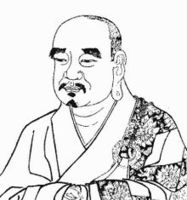Nanyang Huizhong
| PersonType | Category:Ordained (Monks and Nuns) |
|---|---|
| MainNamePhon | Nanyang Huizhong |
| MainNameChi | 南陽慧忠 |
| MainNamePin | Nányáng Huìzhōng |
| AltNamesOther | National Teacher Zhong (Chinese: 忠国师, pinyin: Zhong Guoshi, Japanese: Chū Kokushi) |
| YearBirth | 675 |
| YearDeath | 775 |
| BornIn | Zhuji |
| ReligiousAffiliation | Chan |
| StudentOf | Dajian Huineng |
| IsInGyatsa | No |
| BnwShortPersonBio | Nanyang Huizhong. (J. Nan'yō Echū; K. Namyang Hyech'ung 南陽慧忠) (675?—775). Chinese Chan master of the Tang dynasty; a native of Yuezhou in present-day Zhejiang province. He is said to have studied under the sixth patriarch (Liuzu) Huineng (638–713) as a youth and to have eventually become one of his dharma successors. After Huineng’s death, Nanyang led an itinerant life, traveling from one monastery to the next until he settled down on Mt. Baiya in Nanyang (present-day Henan province), whence he acquired his toponym. He is said to have remained in seclusion on the mountain for some forty years. In 761, he was invited to the palace by Emperor Suzong (r. 756–762), who honored Nanyang as his teacher. He took up residence at the monastery of Qianfusi, but later moved to Guangzhaisi at the request of Emperor Daizong (r. 762–779). Nanyang later established the monasteries of Yanchangsi and Changshousi and installed a copy of the Buddhist canon (Dazangjing) at each site. Juizong [sic] lived during a period of great efflorescence in the Chan school, but he was not closely identified with any one school. He is, however, said to have been critical of the teachings of the Chan master Mazu Daoyi (709–788) and other Hongzhou zong teachers in Sichuan in the south of China, who rejected the authority of the traditional Buddhist scriptures; he is also said to have criticized the Hongzhou interpretation of "mind is buddha" as being akin to the Śreṇika heresy, in which the body is simply an impermanent vessel for an eternal mind or soul. The notion that "inanimate objects can preach the dharma" (wujing shuofa) is also attributed to Nanyang. ("Nanyang Huizhong." In The Princeton Dictionary of Buddhism, 572–73. Princeton University Press, 2014) |
| Other wikis |
If the page does not yet exist on the remote wiki, you can paste the tag |

